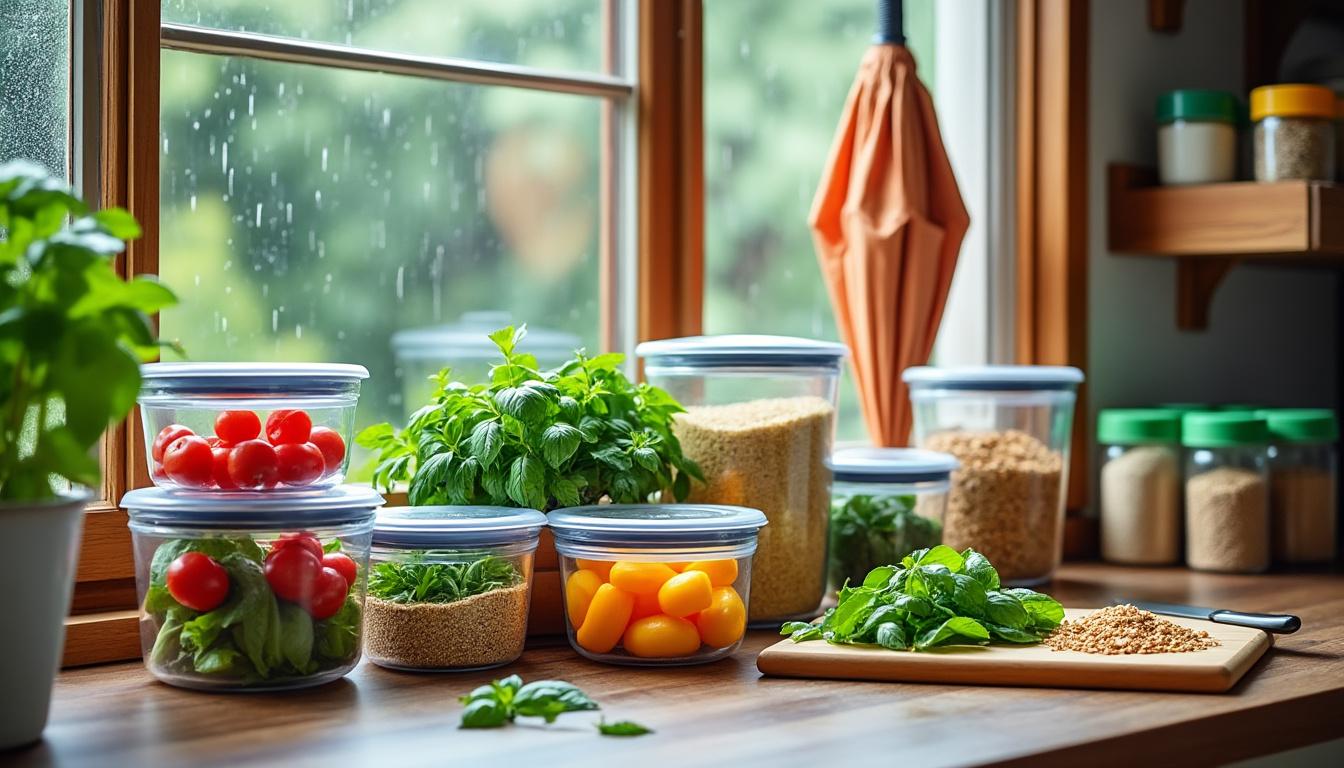The monsoon season brings with it abundant moisture that can quickly compromise the freshness and safety of kitchen ingredients. As rainfall intensifies, kitchens become hotspots for mold, bacteria, and pest infestations if proper precautions aren’t taken. Protecting food during this damp period requires strategic storage solutions, vigilant hygiene practices, and smart management of perishables. Utilizing reliable food storage containers such as Tupperware, Rubbermaid, and FoodSaver, alongside simple yet effective measures, ensures that meals stay delicious and safe despite the challenging environment. This guide presents actionable kitchen tips essential for safeguarding food integrity throughout the monsoon season.
Optimize Food Storage With Airtight and Moisture-Proof Containers
The cornerstone of preserving dry foods like flour, sugar, and spices during the monsoon lies in restricting their exposure to air moisture. Employing containers from trusted brands such as Tupperware, Ziploc, Lock & Lock, and Pyrex ensures airtight sealing that considerably reduces dampness-related spoilage.
- Prefer glass or high-grade plastic containers over loosely sealed jars or paper packaging, which readily absorb moisture.
- Incorporate natural desiccants such as small cloth pouches containing rock salt or silica gel sachets inside storage areas to absorb ambient humidity.
- Regularly inspect and replace seals on containers to maintain their effectiveness in the humid environment.
| Container Type | Material | Moisture Resistance | Best Use Case |
|---|---|---|---|
| Tupperware | High-quality plastic | Excellent airtight seals | Dry ingredients, packed spices |
| Pyrex | Glass with airtight lids | Superior non-porous barrier | Pickles, ready-made foods |
| FoodSaver | Vacuum sealers with plastic bags | Removes air completely | Long-term storage of perishables |
| Rubbermaid | Durable plastic | Good airtight quality | Daily-use storage |
Protect Pickles and Papads from Moisture Damage
Homemade pickles and papads are vulnerable to moisture, accelerating spoilage. Using sterilized glass or ceramic jars from brands like Glad extends their shelf life. Always utilize dry spoons and store these items in cool, dark places to prevent bacterial growth.
- Apply a thin oil layer over pickles to create a moisture barrier.
- Sun-dry or toast papads periodically to retain crispness, avoiding sogginess.
- Inspect jars regularly for condensation and wipe clean immediately.
Keep Spices Fresh and Mold-Free Through Proper Care
Spices are essential flavor components but prone to clumping and mold during monsoon. Pre-toasting powdered spices before storing in non-metal containers such as Snapware glass jars can extend their shelf life significantly by reducing excess moisture.
- Choose glass jars to avoid rust and maintain aroma integrity.
- Toast spices lightly in a dry pan before sealing them to expel residual moisture.
- Store away from heat sources to prevent condensation inside jars.
| Spice Storage Tip | Effect |
|---|---|
| Pre-toasting powders | Reduces moisture, prevents clumping |
| Using glass jars like Snapware | Avoids contamination and preserves aroma |
| Keeping spices away from heat | Minimizes condensation and mold growth |
Maintain Pantry Hygiene and Dehumidify Regularly
Persistent moisture in pantry corners fosters mold and pests. Systematic cleaning and natural dehumidifiers like activated charcoal and neem leaves control these risks effectively.
- Wipe pantry shelves every 7–10 days with a water-vinegar solution for disinfection and drying.
- Place moisture absorbers such as baking soda packets or dry neem leaves in corners.
- Ensure good airflow by keeping pantry doors ajar during dry days to prevent stagnant humidity.
These practices uphold the integrity of stored grains and prevent fungal or insect infestations notorious in monsoon conditions.
Leverage Natural Preservatives with Grains and Pulses
In monsoon humidity, raw grains and pulses become susceptible to fungi and insects. Integrating natural preservatives into storage containers provides an eco-friendly protective layer. Incorporate substances like bay leaves, dried red chilies, neem leaves, or cloves to deter pests while absorbing moisture.
- Replace or sun-dry grains on dry days to reduce moisture accumulation.
- Combine natural repellents with airtight containers like OXO or Rubbermaid to enhance efficacy.
- Regularly inspect storage for early signs of spoilage or infestation.
| Natural Preservative | Benefit |
|---|---|
| Bay leaves | Insect repellent, moisture absorber |
| Neem leaves | Antifungal and insect deterrent |
| Dried red chilies | Repels pests naturally |
| Cloves | Preserves aroma, anti-moisture effect |
Refrigerator Usage Strategies to Maximize Food Longevity
Proper refrigerator management prevents moisture buildup and uneven cooling, two common pitfalls during monsoon. Avoid overloading and utilize transparent storage boxes from brands like Glad and Lock & Lock to monitor contents easily.
- Dry herbs and vegetables thoroughly before refrigerating to minimize internal moisture.
- Place odor and moisture absorbers such as baking soda or coffee grounds inside the fridge compartments.
- Organize items to improve airflow and reduce spoilage.
| Refrigerator Management Tip | Benefit |
|---|---|
| Avoid overloading fridge | Ensures uniform cooling and airflow |
| Use transparent boxes (Glad, Lock & Lock) | Eases content monitoring and cleanliness |
| Include baking soda or coffee grounds | Neutralizes odors, absorbs moisture |
Handle Fresh Produce with Care to Extend Shelf Life
Water droplets accelerate decay on vegetables and fruits, so thorough drying post-wash is critical. Wrapping leafy greens in paper towels to absorb excess moisture and avoiding storage of overripe fruits with others minimize ethylene-driven spoilage.
- Dry leafy vegetables immediately after washing and store in breathable containers like Snapware.
- Purchase fresh produce in smaller quantities, especially during sustained rainy periods.
- Limit storage time of perishable greens to 1-2 days and consume promptly.
Prudent Management of Perishables and Raw Sprouts
Given the heightened risks of bacterial growth, raw sprouts and leafy greens require cautious handling during monsoon. Boiling sprouts before consumption significantly reduces health risks, and air-tight storage for leafy greens from healthy suppliers helps avoid contamination.
- Avoid excessive raw consumption of sprouts; cook before use.
- Limit leafy greens usage to within two days after purchase.
- Opt for monsoon-friendly vegetables such as bottle gourd, ridge gourd, and beans to maintain nutritional intake safely.
Maintain a Dry and Well-Ventilated Kitchen Environment
High humidity plus inadequate kitchen ventilation create fertile grounds for mold, pests, and unpleasant odors. Installing exhaust fans or dehumidifiers and promptly cleaning spills contribute greatly to maintaining a hygienic cooking space where food safety is prioritized.
- Keep windows open on dry days to enhance airflow.
- Use suitable dehumidifiers or exhaust fans to reduce moisture buildup.
- Clean countertops regularly with a vinegar-water solution to inhibit microbial growth.
| Kitchen Environment Tactic | Positive Outcome |
|---|---|
| Open windows when possible | Improves ventilation, reduces dampness |
| Exhaust fan or dehumidifier use | Controls indoor humidity and odors |
| Vinegar solution cleaning | Prevents mold growth and pests |
Frequently Asked Questions About Monsoon Food Safety
- How can airtight containers from brands like Ziploc and Snapware improve food safety during monsoon?
They effectively block moisture penetration, limiting mold growth and preserving ingredient freshness. - Is it advisable to stock large quantities of perishables during monsoon?
No, purchasing smaller quantities frequently reduces the risk of spoilage and waste. - What natural preservatives help in protecting grains during the rainy season?
Bay leaves, neem leaves, cloves, and dried red chilies work as insect repellents and moisture absorbers. - Why is ventilation crucial in a kitchen during monsoon?
Ventilation disperses excess humidity, preventing mold formation and pest infestations that compromise food safety. - How to handle raw sprouts safely in the monsoon season?
Boil sprouts before consumption to reduce bacterial contamination and avoid raw intake as much as possible.

